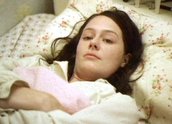


Love Serenade (1996)
Synopsis
Washed up Brisbane disc jockey Ken Sherry (George Shevtsov) takes over the one-man radio station in Sunray, a small town on the Murray River. Vicki-Anne Hurley (Rebecca Frith), the local hairdresser who is also single and disappointed in love, sees her new neighbour as a terrific catch, but younger sister Dimity (Miranda Otto) gets in first. Dimity is an awkward and painfully shy 20-year-old eager to experience love. Sherry is a sleazy opportunist with a string of failed relationships, but a faint hint of glamour. As the sisters vie for his attention, Dimity notices something strange. She asks her boss Albert Lee (John Alansu), proprietor of the Chinese restaurant, if some men have gills, like fish. When Sherry dashes Vicki-Anne’s matrimonial fantasies, Vicki-Anne climbs the only tall building in Sunray – the wheat silo.
Curator’s notes
Love Serenade was a bold and imaginative debut from Shirley Barrett, an attempt to get inside the loneliness of a small and stifling Australian town without becoming predictable or pompous. The script walks a difficult line, wanting to depict the limiting effects of the town on its characters, without turning them into caricatures or victims. Barrett has said that Ken Sherry was a combination of 'every Mr Wrong’, and the decision to make him a broken-down disc jockey came directly from the inspiration of the songs on the soundtrack. Barry White’s sleazy lyrics, pumping out over public speakers in the dusty streets of Sunray, are a perfect match for Ken Sherry’s cliché-ridden, 'big city’ radio patois. The fact that the two sisters could fall for it tells us how innocent and isolated they are.
Much of the comedy comes from the dynamics between the sisters. Vicki-Anne believes she is normal and that Dimity is odd, which gives her not just the right, but the responsibility to dominate her. When Dimity throws herself at Ken Sherry, it is a declaration of independence, if not war, aimed at her sister. Vicki-Anne, for her part, responds with equal ruthlessness, but less self-awareness. Their disagreements are continuations of the battles fought since childhood. In a sense, they are trapped in those bonds, as well as by this town, and by their now adult biology.
The boldest stroke, in comic terms, is to have Ken Sherry turning back into a fish – a continuation of the idea of biology as a powerful determinant. He is literally devolving back to the earlier life forms from which humans evolved. It’s a credit to Barrett’s light touch, and the performances of the actors, that the film can get away with such an outrageous joke.
- Overview
- Curator’s notes
- Video 3 clips

- Principal credits
- Find a copy
- Make a comment
- Map
- Add your review



